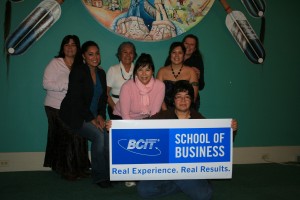Effective Learning & Affecting Change: BCIT and First Nations Pair for HR Pilot

(L to R) Jacqueline McKay, Katy Gottfriedson, Roberta Moses, Jackie Jules, Barbara Jules (holding the sign), Valerie Matthews and Leona Rabbitt
By Jennifer-Gerves Keen
Accessible and effective learning and development is the cornerstone of civilization as we know it. In order to maintain the excellent standard of living that many of us enjoy here in Canada, we need to start paying attention to the future of learning…and the flexibility and openness that it needs to represent.
In June 2011, the Corporate & Industry Training department of the School of Business of BC Institute of Technology (BCIT) launched a pilot project that goes to the heart of such thinking: delivering the BCIT Human Resource Management certificate in collaboration with the BC Aboriginal Mining Training Association (BCAMTA).
One of the most effective ways to learn and be engaged as an adult learner is through work experience. The work of organizations such as BCAMTA is to engage individuals in successful careers through partnerships with potential employers; partnerships with BCIT and other educational institutions give them even further recognition and solid credentials. These types of partnerships also give individuals access to education and learning that might not be possible when presented in more traditional formats.
Both the format and the audience were unique, as was my opportunity to step aboard as a core instructor of a truly innovative initiative. This marked the first time BCAMTA delivered a ‘professional’, diploma program; it was also the first time BCIT condensed the HR certificate into an intensive delivery schedule.
Those who have pursued the BCIT HR certificate through traditional part-time studies are familiar with the intensity of the workload. The delivery method for this particular pilot, though challenging, was agreed upon as the ideal format for focused efficiency and student effectiveness: an intensive, almost full-time approach. As such, the 15 courses were divided into two week modules, each delivered four days a week over a period of six and half months – with no breaks.
Eyebrows were raised at the notion of a pilot project that tackled the requisite course work in six months, replete with assignments, textbooks, mid-terms, group project work and finals. As a training and development professional, my concerns centred on whether we could keep the motivation high enough throughout to prevent burnout, dropouts or poor results.
Nearly six months later, those fears have proven unfounded and valuable lessons have been learned on all sides of the learning equation. With nine students put forward by BCAMTA following a demanding selection process, the pilot is finishing with seven, a retention rate of 78 per cent.
Taken out of their comfort zones, confronted with a massive workload and faced with new instructors every two weeks the students’ resilience and commitment has been inspiring, especially in consideration of other factors ranging from full-time jobs to family and health issues. These students are living proof of what people can accomplish from any background when challenged to push their boundaries and given an opportunity to focus on their own development.
Also inspiring has been the ripple effect in their respective First Nations communities; the knowledge which some of the participants carry back with them is already having a positive impact on developing policies and procedures that further facilitate self-governance. Others are sharing their new knowledge of recruitment tools to help family members and friends with successful job searches. Some wish to stay in their communities; others are looking for a complete change.
As all of those participating in the pilot project have been women, representing three different generations from four different First Nations communities in the Kamloops area, they are living proof the African proverb: “If you educate a man you educate an individual, but if you educate a woman you educate a family (nation).”
My own cultural learning has been enriched immeasurably by the experience. First Nations culture and learning is alive and well within these communities and the different perspectives and added value that they can bring to an employer should not be overlooked. As a learning experiment, this BCIT/BCAMTA pilot project is in many ways just the beginning for the talented graduating class and future initiatives; the words of Dr. Seuss seem most appropriate for all involved:
“You have brains in your head. You have feet in your shoes. You can steer yourself in any direction you choose. You’re on your own. And you know what you know. You are the guy who’ll decide where to go.”
As a professional facilitator, speaker and coach, Jennifer Gerves-Keen (www.jgkonline.com) has worked alongside some of the world’s largest and most successful organizations.
(PeopleTalk Winter 2011)








